Meet the Festival Filmmakers: Part 3
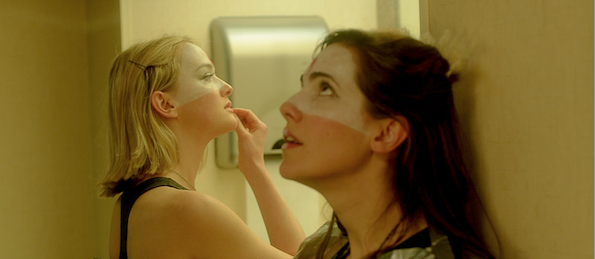
In this edition of our “Meet the Filmmaker” blog series, we hear from some of the Los Angeles Film Festival’s female directors, whose films will be showing in various sections across the Festival. We’re proud to report that the women featured here are just a sampling of the many talented female directors whose work is screening at this year’s Festival. (To meet the narrative competition filmmakers, go to Part 2. For the LA Muse section filmmakers, go to Part 1.)
 “Directing is like playing Tetris.”
“Directing is like playing Tetris.”
Jennifer Prediger and Jess Weixler will be costarring in and making their feature directorial debuts with Trouble Dolls, part of the festival’s LA Muse section. The two real-life friends star as codependent performance-artist roommates who leave their miniscule Manhattan apartment for LA, where they audition for a reality TV talent show. They were inspired by their experience living together in what they call a “Bohemian illegal sublet situation in the East Village,” as well as the comedy duos of classic buddy movies.
What’s your first memory of sitting in a movie theater?
We both have our first real theater memories seeing The Little Mermaid. Jess had her birthday party at the movie theater. Jennifer had her first kiss in a movie theater during Dances with Wolves and it was gross. Jess’s first kiss was also gross, but on a playground…wait, were we talking about first movies? 🙂
What do you love most about being a filmmaker?
Collaborating with so many talented people—with every department from wardrobe to set design to cinematography. This is where a film comes to life from the creative ideas and input from all of these people. It’s such a beautiful, fun thing to see your ideas come to life at the hands of such incredibly talented collaborators who cared about helping us realize our vision.
What do you like least about it?
The devil really is in the details. The logistics of moving a film army are quite overwhelming. Thankfully during production we didn’t have to think much about that because our producers wanted to create a directing bubble for us so we could focus on the big picture of telling the story. You need to have or generate constant reaffirmation to keep going. There’s a real fluctuation between “this is brilliant” and ‘”this is crap.” You have to keep moving forward until things work. It was really helpful having a co-director.
What’s the biggest difference between the reality of being a filmmaker and your dream of it?
Dreamed we would have directors’ chairs with our names on them but as it was a 15-day shoot we actually never sat down. Imagined discussing the light and mood and subtext on set but at a certain point you are just trying to move as quickly as possible and the clock becomes the director. Directing is like playing Tetris, the closer you get to the end of each day the faster you have to puzzle the pieces so they don’t jam up.
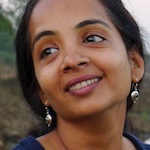 “I overcame my inhibition towards crowdfunding.”
“I overcame my inhibition towards crowdfunding.”
Mumbai-born and Zurich-based filmmaker Farida Pacha makes her directorial debut with My Name is Salt, showing in the festival’s documentary competition. The film documents the difficult work of a family in the desert of Little Raan, India, who are part of an old tradition of salt farming. Pacha spent two years traveling through the desert, staying with different families, and eventually chose the family featured as the documentary’s main protagonists because it “had a clear generational structure,” and because she was “deeply impressed by [the father’s] dedication and meticulousless.”
What’s your first memory of sitting in a movie theater?
One of my first distinct memories is of an early Sunday morning matinee show of a hilarious black and white Hindi comedy, Hungama Bombay Ishtyle. I must have been around six years old.
What’s the biggest obstacle you encountered in the making of this film and how did you overcome it?
Funding. Only after two years of failing to find post-production money, I overcame my inhibition towards crowdfunding. That was the breakthrough in completing the movie.
What’s the biggest difference between the reality of being a filmmaker and your dream of it?
The time and effort it takes to finish a film.
Have you ever considered throwing in the towel on filmmaking and if yes, what stopped you?
I consider it every day, but then I always put it off till tomorrow.
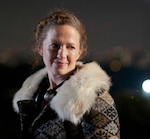 “My first movie theater was an old sofa dragged out into a field in Tennessee…”
“My first movie theater was an old sofa dragged out into a field in Tennessee…”
Mo Perkins will be at the festival with her second feature, The Last Time You Had Fun, which will be premiering in the Summer Showcase section. The film follows four thirty-something friends, struggling with the realities of adulthood, who hit the town together one night to prove to themselves that they can still have a good time. Perkins says about the film, “for me this is a movie about how unsuccessful most of us are at being grown-ups, and what happens one night to these four people when they stop trying so hard.”
What’s your first memory of sitting in a movie theater?
My first movie theater was an old sofa dragged out into a field in Tennessee and plunked down in front of a screen made of bed sheets. I think I was seven.
Will this be your first experience with the LA Film Festival? If not, what was your first experience—and what was memorable about it?
I came with a short film in 2012. My favorite part of that was meeting other filmmakers. I had a wonderful time talking with an experimental short filmmaker about his film on the kudzu vine that grows throughout the South. I also loved the audiences. After one screening a teenage boy came up to me with questions about the film. He was excited and had ideas about how to make it longer and I just thought, wow, he was really connecting to it. It’s the kind of moment that makes all the hard work worthwhile.
What’s the biggest obstacle you encountered in the making of this film and how did you overcome it?
Filmmaking is an unending wave of obstacles big and small. I just try to focus on the one that’s the most urgent and deal with them as they come.
Have you ever considered throwing in the towel on filmmaking and if yes, what stopped you?
Not really. At least not seriously. There isn’t anything else that seems like it would be as much fun.
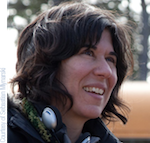 “This first memory was the physiological response of getting a lump in my throat.”
“This first memory was the physiological response of getting a lump in my throat.”
Debra Granik, director of Winter’s Bone, will premiere her third feature film, Stray Dog in the Documentary Competition. The film follows a biker, Ron “Stray Dog” Hall, as he rides with his fellow veterans from Missouri to DC to visit the Vietnam Veterans Memorial. She says her inspiration for the film was “being invited to Mars. We were greeted by a welcoming emissary—a natural born storyteller and diplomat who was willing to guide observers and visitors from Venus.”
What’s your first memory of sitting in a movie theater?
My first memories are films like Sounder, and Island of the Blue Dolphins. At a very early age, I learned how hard a film can hit when it succeeds in making you care about a character. This first memory was the physiological response of getting a lump in my throat. The power of tapping into universal experience, the emotional intensity of putting yourself in another’s shoes. And how photographic images of a character, a setting, lighting can leave indelible imprints. The power of movies to do this took me by the throat as a kid.
What do you love most about being a filmmaker?
Encountering the puzzle and mystery of the different ways fellow beings cope and carry on. Observing and trying to record how the big forces shape us, how we morph, and what subcultural proclivities we migrate towards. On a good day, it can be as fulfilling as repeating the mantra, “I don’t have to figure it out. My work is to take notes, try to stay present to the lyrical, find and record the ways people make life worth living.” I love seeing films from around the world, appreciating the moxie of other documentarians, the learning from other scribes who take their notes through moving images.
What do you like least about it?
When I can’t solve how to make a story work. Finding the limits of what I know how to do. Accepting that. Hard!!! Fear of being excluded—having the themes and stories I care most about be of “no commercial value,” which can translate to no value at all, not worthy, and the fear of losing my resolve.
What’s the biggest difference between the reality of being a filmmaker and your dream of it?
I’m a hard-nosed realist. The idea of guerilla style small crew, frugal budgets is what I’ve always wanted the filmmaking process to be. I want it to be accessible, not corporate, not subsumed by P&A, social media, drooling and tweeting, nor star-driven. When I see how strangulating high-stakes financing is in our culture, I feel quite crazy with frustration. My dream is that one can create good work with a small crew and always find a way to cast without calculating an actor’s finance-ability. My dream is that we’d be a country with a film culture that could get excited about new and unknown faces on screen.
Have you ever considered throwing in the towel on filmmaking and if yes, what stopped you?
Filmmaking is often heart-breaking and confining, with so many legal, accounting and labor rules. Money worries to the point of asphyxiation. So much administration, so many additional worries on the back-end about admission into festivals and if anyone will like it. But yet, we do it again. When you have a few people with whom you love to create and think alongside, there’s an ongoing rich journey for the mind and imagination that’s hard to not take.
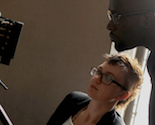 “I didn’t like shooting vérité as someone was crying.”
“I didn’t like shooting vérité as someone was crying.”
blair dorosh-walther, who identifies as “gender-non-conforming” makes hir directorial debut with her film Out in the Night, which will have its world premiere as part of the festival’s documentary competition. The film examines the 2006 case of four gay African-American women, assaulted by a stranger in the streets of New York City in the middle of the night, whose attempts to defend themselves were spun into a sensational “Attack of the Killer Lesbians” story by the press and led to unjust conviction and imprisonment. dorosh-walther says “two years after it happened, I could not stop thinking about it and decided to commit the next seven years of my life to making this film.”
What do you love most about being a filmmaker?
My approach to filmmaking is both political and practical. I very much identify as an Anarchist; I have it in my blood. Oddly, the act of making an independent film feels like the truest way for me to live that out in my career. When it works correctly, filmmaking is about a small, passionate and dedicated group of people governing equally. We work equally in our specific roles for a common and shared vision. I love that part of filmmaking. F or me it is the lens through which I see and feel the process. The second reason I absolutely love filmmaking is that it is process orientated. I like that every day brings something totally new. There is no set equation to getting a shoot or a film done. I like that it is risky. I like moving in worlds between on-site shooting to grant writing and articulating on paper your vision, to story development, to budgeting, to working hard with people whom you trust. The third reason is that I have never felt articulate with written language. Abstractions found in mediums like painting or sculpture have made more sense to me. The reason that fine arts were never a sole option for me is because of that abstraction in my painting and sculpture. I want access to meaning and justice to be more transparent. In my ‘other’ life, in social services and activism, I’ve paid attention to those things. So, filmmaking—visual storytelling—merges these two parts of me in a way that feels whole.
What do you like least about it?
Funding is a true obstacle. We never had enough funding at one time in the making of this film. It was a constant struggle that made the filmmaking process longer and harder than it needed to be.
How long have you been working on the film, from idea to execution?
I first became involved as an activist around this case on the day after the fight occurred. I read the media coverage the following day and I did not know what had happened, but I was sure that a stranger on the street at 1 a.m. was not “admiring” a woman walking by him. I haven’t met a woman who hasn’t been harassed on the street at some point in her life, so at the bare minimum, this felt disgusting to me. I worked on and off as an activist on the case for two years. Then, in 2008 when they were going to have their appeals heard, I realized I was still so outraged and felt that they never had their story told thoroughly and loudly enough. That is when I decided to start filming. That was seven years ago.
What’s the biggest obstacle you encountered in the making of this film and how did you overcome it?
I didn’t like shooting vérité as someone was crying; it felt voyeuristic. I didn’t like the feeling of raising money for a shoot when that shoot would be an interview with a mother living in a homeless shelter. I didn’t like waiting quietly for someone to be released from prison. I wanted to put the camera down and yell. Mostly, my challenge has been to find that almost-impossible balance of filmmaker/advocate/ activist. Being a documentary storyteller sometimes means calming your sense of moral outrage and fury at injustice so that you do press ‘record’.
Mary Sollosi / Festival Blogger